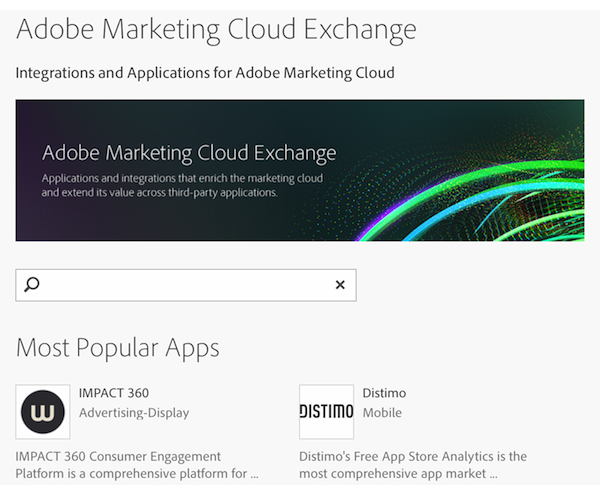
The battle of the marketing clouds is heating up.
Last month Oracle announced its unified Oracle Marketing Cloud, and yesterday IBM introduced ExperienceOne — both massive visions of how all the different acquisitions they’ve made in the marketing space will be stitched together into more cohesive offerings.
But with all these proclamations of marketing technology nirvana, I have one overriding criterion that I look for: do they embrace an open model for third-party marketing applications? Who will be the next major marketing cloud to challenge Marketo’s open platform strategy?
The winner: Adobe.
Yesterday, Adobe unveiled its Marketing Cloud Exchange, an app-like store of third-party products that can be easily integrated into Adobe’s Marketing Cloud infrastructure, at least at a core data level.
They’re launching with more than 150 apps in their exchange, which has apparently already been leveraged by more than 1,200 major brand customers worldwide in an extensive beta program.
To quote the blog post from Suresh Vittal, VP of marketing strategy for Adobe’s digital marketing business, “A big part of getting to the point where a company is realizing the promise of digital marketing is to democratize their critical marketing data across products and platforms.” (Emphasis added is mine.)
This is not a we do everything you would ever want in digital marketing position. This is a position that acknowledges that third-party innovation is a critical part of digital marketing — that a 1,000 innovators of marketing technology can be an incredible source of strength. This is a we can be the foundation of everything you would ever want in digital marketing position.
A subtle, but incredibly important, distinction.
More from Suresh: “The Adobe Marketing Cloud Exchange Program is the most effective way for Adobe’s partners to leverage their resources to build reusable integrations with Adobe Marketing Cloud and make those integrations discoverable and available to Marketing Cloud customers.” (My emphasis on discoverable — since that’s the difference between third-parties in the parlor vs. third-parties in the basement.)
Now, let me acknowledge that almost all major marketing clouds — or as I’ve called them, marketing backbone platforms — have some degree of openness. Salesforce’s CRM has been a paragon of an open platform strategy. ExactTarget, which has become part of the Salesforce marketing cloud, has their HubExchange (although it’s recently been demoted off a prime position on their home page). IBM has their Digital Data Exchange (DDX). Oracle has the Eloqua AppCloud. Although for these last two, it’s worth noting that neither were mentioned in IBM’s and Oracle’s latest press releases on their marketing cloud visions.
It’s a difference as to whether they look at an open ecosystem as a major part of their strategy, which they prominently tout in their marketing and sales — or whether such integrations are treated more as back-office wiring or a “check the box” kind of openness.
Since strategy sets priorities, and priorities have a real effect on the engineering evolution of software products, this isn’t just a matter of semantics. It signals the intentions of how these platforms intend to progress. And that signaling will have an effect on customer acquisition and third-party developer support.
I think this is a brilliant move on Adobe’s part — and a great step forward for our industry.
Now let’s see how Adobe and Marketo follow through on their open platform visions. And who follows next.
By the way, if you’re interested in a vendor neutral discussion of marketing cloud strategies, I’d highly encourage you to consider attending MarTech: The Marketing Tech Conference this August in Boston.
Travis Wright will be giving a terrific presentation on To Build or Buy Your Own Marketing Cloud.
David Raab will be sharing his insights on How to Align Marketing Technology with Business Strategy.
And there will be more than a dozen other renown marketing technology analysts and practitioners speaking on leading edge topics of marketing technology management.



